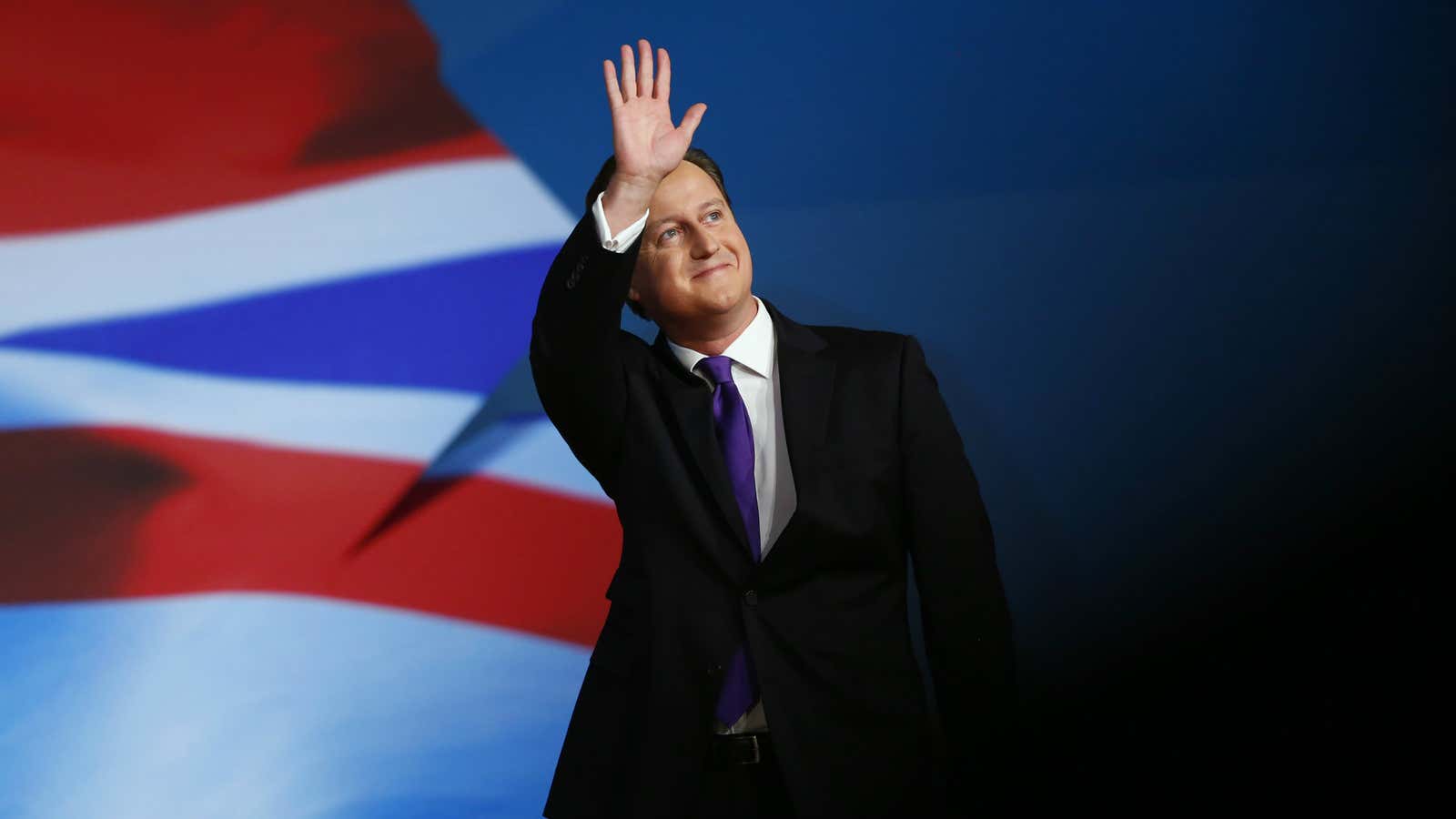British prime minister David Cameron has a clear message for fellow EU leaders: it’s not me, it’s you.
In a speech delivered at Chatham House today (Nov. 10), Cameron set out his “practical, not emotional” demands to create a model of EU membership “that works for Britain.” He insisted the UK has no interest in being part of a United States of Europe.
Fulfilling Cameron’s pre-election promise, parliament passed a law calling for a referendum on the UK’s “renegotiated” membership in the EU by 2017 at the latest. Today’s speech detailed the main points that Cameron wants to renegotiate before calling the vote.
Cameron started campaigning for “substantial” changes to the UK’s relationship with the EU in a pivotal 2013 speech, citing the euro-zone financial crisis, Europe’s declining economic competitiveness, and the EU’s perceived lack of democratic legitimacy among citizens as motivations for a rethink of the UK’s position in the bloc. He added a fourth issue in his speech today—the European refugee crisis.
“I am in no doubt that for Britain the European question is not just a matter of economic security, but of national security too—not just a matter of jobs and trade but of the safety and security of our nation,” Cameron said.
While the prime minister has pledged to campaign with “all his heart and soul” for Britain to stay in the EU, he warns that all bets are off if he does not get a satisfactory deal. His proposals were submitted today to Donald Tusk, president of the European Council, marking the official start of the renegotiation.
If the referendum was held today, polls suggest that voters might narrowly back to leave to the EU. Cameron stressed that his renegotiation will determine how the British people vote, telling EU leaders that “this is our only chance to get this right.”
Cameron acknowledged his plans wouldn’t make everyone happy, but for now it doesn’t look like anyone really is. The European Commission described some of Cameron’s demands as “highly problematic,” while Nigel Farage, the leader of UKIP, a vehemently anti-EU political party, says its “clear that Mr Cameron is not aiming for any substantial renegotiation.”
This is what Cameron is proposing:
The euro zone should mind its own business
While the UK won’t stand in the way of a strong euro zone, Cameron makes it clear he’s not interested in Britain being part of an “ever closer union.” He will seek a legally binding agreement that recognizes the EU as a union with more than one currency, and ensures that taxpayers from non-euro zone countries won’t be compelled to bail out euro-zone countries.
EU courts should mind their own business
Cameron reaffirmed his commitment to scrap the Human Rights Act and replace it with a British Bill of Rights. He plans to introduce legislation to curb the powers of the European Court of Justice. He’s keen to prevent legal challenges to local rules that cite the EU Charter to promote “spurious new human rights grounds.”
He also wants groups of national parliaments to be able to block EU laws. No national parliament will get its own veto, but Cameron wants to ensure national parliaments can join up to block EU laws, so they remain the “main source of real democratic legitimacy and accountability in the EU.”
EU red tape shouldn’t extend across the Channel
Cameron wants to impose ”a target to cut the total burden” that EU-wide regulations have on business. Competitiveness, he adds, needs to be “written into the DNA” of the union. “We want a European Union that adds to our competitiveness, not detracts from it,” he says. “It needs to become more competitive to cope with the rise of economies like China and India.”
The free movement of people should be less free
While Cameron agrees that the principle of free movement of labor is fundamental to the EU, he says many are abusing this principle. He aims to restore “a sense of fairness” to the migration process.
He says that Europe’s ongoing refugee crisis is not an issue of race, but scale and speed. He wants European leaders to ensure that the EU’s free-movement rules do not apply to new countries that may join the EU “until their economies have converged much more closely with existing member states.”
He also aims to reduce the draw of the UK’s benefit system to EU migrants by preventing them from claiming benefits until they have paid into the system for four years. This point, in particular, is in opposition to the EU’s founding treaty, and won’t be easy to achieve.
